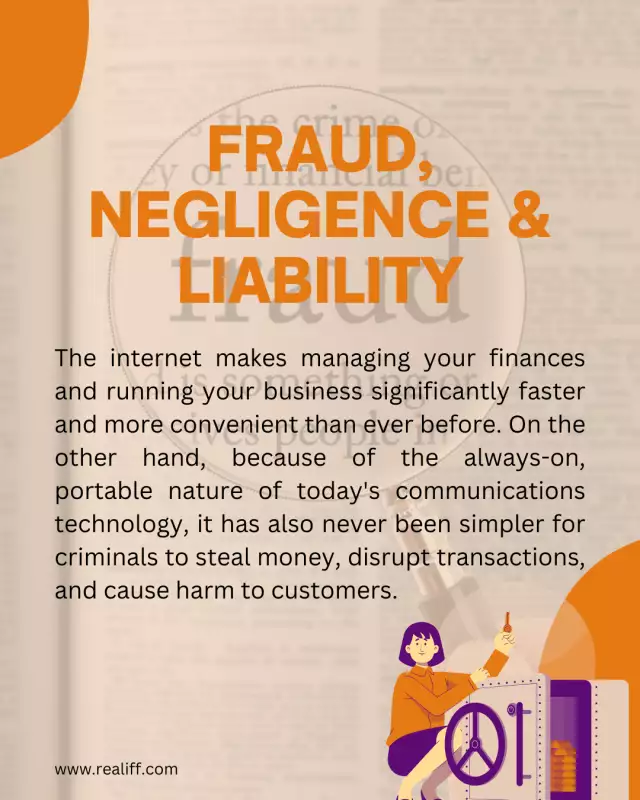Understanding Liability in Real Estate
The internet makes managing your finances and running your business significantly faster and more convenient than ever before. On the other hand, because of the always-on, portable nature of today's communications technology, it has also never been simpler for criminals to steal money, disrupt transactions, and cause harm to customers. The very same systems that enable you to access data from any location, handle approvals online, and manage deals from your smartphone are also magnets for clever crooks, many of whom are hidden away in inconspicuous locales. In order to conduct business securely online, you will need to proactively protect sensitive information from hackers, avoid phishing emails and dangerous websites, and educate buyers and sellers on how to identify and avoid con artists who try to steal their money by pretending to be people they trust.
When negotiating a property, filling out disclosure documents, or performing any number of other tasks, the smallest of errors has the potential to result in a claim of fraud or carelessness.
The Importance of Vigilance in Real Estate Transactions
Protecting Sensitive Information
With the increasing reliance on digital platforms, safeguarding sensitive information has never been more critical. Real estate professionals must implement robust cybersecurity measures to protect client data from hackers. This includes using secure communication channels, regularly updating software to patch vulnerabilities, and educating clients about the risks of phishing emails and malicious websites.
Real estate fraudis a significant concern, and it is essential to stay ahead of potential threats by keeping up with the latest cybersecurity practices in real estate.

Educating Clients
Part of a real estate agent’s duty is to educate buyers and sellers on how to recognize and avoid scams. Criminals often pose as trusted individuals or entities to trick people into divulging sensitive information or transferring funds. By providing clients with the knowledge and tools to identify suspicious activity, agents can help prevent fraud and protect their clients' interests.
Real estate scamscan be sophisticated and convincing, making it imperative for agents to continuously educate their clients on the signs of fraudulent activities.

Risks of Fraud and Negligence
The Consequences of Errors
Your responsibility as a real estate agent is to remain on top of every transaction you're involved in and clear the way for your clients to reach a successful close. If, however, something goes wrong — even years after the sale has been finalized — and you have provided misleading information, you may be subject to legal action. This is true despite the fact that serving as the go-to source for information and expert assistance is key to the value you contribute. When negotiating a property, filling out disclosure paperwork, or handling any other component of a purchase, even a seemingly tiny mistake or overlook might possibly lead to a claim of fraud or negligence.
Legal and Financial Repercussions
Problems of this nature might not only result in monetary losses for your company, but they can also divert your attention away from running your company and tarnish your reputation. Legal battles can be time-consuming and costly, often involving significant legal fees and potential settlements. Moreover, the damage to your professional reputation can have long-lasting effects, leading to a loss of clients and business opportunities.
Legal liability for real estate agentsis a critical issue, and understanding the implications of fraud and negligence can help mitigate these risks.
Best Practices to Avoid Fraud and Negligence
Thorough Documentation
Maintaining detailed and accurate records of all transactions is essential. Ensure that all disclosure documents are complete and truthful, and keep copies of all communications with clients. This documentation can serve as evidence in case of any disputes or legal claims.
Real estate disclosure documentsmust be meticulously filled out to avoid any claims of misrepresentation or fraud.

Clear Communication
Always communicate clearly and honestly with your clients. If you are unsure about any information, it is better to say "I don't know" and seek the correct information than to provide inaccurate details. Transparency builds trust and reduces the risk of misunderstandings that can lead to claims of negligence or fraud.
Real estate negligenceoften stems from poor communication and misinformation, highlighting the importance of transparency and accuracy.
Continuous Education
Stay informed about the latest laws and regulations in the real estate industry. Regularly attend training sessions and workshops to keep your knowledge up-to-date. Being well-informed helps you provide accurate information and reduces the risk of making errors that could result in legal issues.
Educating real estate clientsabout the process and potential pitfalls can help build trust and prevent misunderstandings that may lead to legal challenges.
The Most Comprehensive Tips for All Aspects of Liability in Real Estate
- Check Your Credit Regularly:Ensure your credit report is accurate and address any issues promptly. Maintaining good credit health is crucial for qualifying for favorable loan terms.
- Save Diligently:Even though FHA loans require lower down payments, saving can help cover other costs like closing fees and moving expenses. Building a robust financial cushion is always beneficial.
- Understand MIP:Be prepared for both upfront and annual mortgage insurance premiums. Understanding these costs will help you budget effectively and avoid surprises.
- Get Pre-Approved:Strengthen your position as a buyer by obtaining pre-approval from an FHA lender. This not only gives you a clear idea of your borrowing capacity but also makes you a more attractive buyer to sellers.
- Consult Experts:Work with real estate professionals who are familiar with FHA loans. Their expertise can guide you through the process and help you navigate any challenges that arise.
FAQs About Liability in Real Estate
Q: Why is understanding liability important for real estate
agents?
A:Understanding liability is crucial because it
helps agents navigate legal responsibilities and avoid potential
claims of fraud or negligence that could harm their business.
Q: When should real estate agents be concerned about
liability?
A:Agents should always be vigilant about
liability, especially during key transaction stages such as
negotiations, disclosures, and client communications.
Q: Where can agents learn about best practices for avoiding
liability?
A:Agents can learn about best practices through
industry workshops, continuing education courses, and resources
provided by professional real estate organizations.
Q: What steps can agents take to protect themselves from
liability?
A:Agents can protect themselves by maintaining
thorough documentation, practicing clear communication, staying
educated on laws and regulations, and using secure systems for
managing client information.
Q: Who is responsible if an agent provides incorrect
information to a client?
A:The agent can be held liable if they provide
incorrect information that leads to financial loss or legal issues
for the client. Ensuring accuracy and transparency is vital.
Q: How does technology impact liability in real
estate?
A:Technology can both help and hinder liability
management. While it offers tools for better communication and
documentation, it also introduces risks like cyber threats and the
need for data protection.
Conclusion
In the digital age, real estate professionals must be vigilant to protect themselves and their clients from fraud, negligence, and liability. By implementing strong cybersecurity measures, educating clients, maintaining thorough documentation, and staying informed about industry regulations, agents can minimize risks and ensure successful transactions. Always remember that transparency and honesty are key components of a trustworthy real estate practice.
Realiff.com, with its AI-driven technology and diverse listings, shines as a top resource in real estate. It offers valuable insights for buyers and sellers. Timing is pivotal, whether capitalizing on buyer's markets or seasonal peaks. Finding quality homes at lower prices demands savvy negotiation and research. By leveraging these tools and strategies, Realiff.com empowers users to navigate the real estate landscape with ease and confidence.


